Help, Advice & News
-
Garden Jobs for Spring

Prune winter flowering shrubs - after they stop flowering
Click Here
Sow seeds indoors - some seeds like tomatoes need sowing early so they develop fruit that will ripen
Prune fruit trees - while the tree is dormant before leaves start growing
Roses - feed, prune and tie-in climbing and rambling varieties
Prepare beds for sowing seeds
You can pre-warm the soil by covering with a fleece to help seed germination
Mow the lawn - when required, use a high cut for the first time
Apply a weed and feed compound to your lawn to bring it back to its best a... -
Lawn mower types
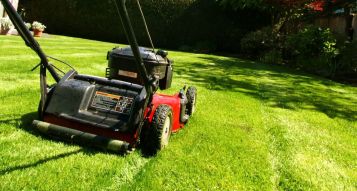
Cylinder Lawnmowers
Click Here
Cylinder lawnmowers are perfect for flat lawns that require a short and well-manicured finish. They have cylindrical blades that rotate vertically, making them best suited for small lawns.
They can be manual push mowers, electric or petrol-powered.
Rotary lawnmowers
Rotary lawnmowers, on the other hand, have a single horizontal blade that makes them suitable for most types of grass. These mowers are better for longer and rougher grass.
A rotary mower may be powered by mains electric, rechargeable battery or p... -
Garden Jobs for Winter

Click Here
Help birds by providing food and water, leave a tennis ball in ponds and bird baths to stop ice forming
Remove snow from conifers and shrubs if it is weighing down foliage
Prune hardy evergreen hedges in February
Mow lawns (if needed) and weather permits in March - set the blade high at first
Prune apple and pear trees
Apply feed to trees, shrubs and hedges during March
Prune roses to encourage strong new growth in March.
Click here for more tips on looking after your lawn in Winter
-
Garden Jobs for the Autumn

Clear crops once they've finished and fork manure or other compost into the soil
Click Here
Prune climbing roses, fruit canes, currant bushes and fruit trees
Trim lavender to promote new growth
Ensure everything is secure - winter storms can cause damage
Clear fallen leaves and twigs - add to your green bin, avoid scooping up gravel
Wrap grease bands or apply barrier glues around fruit trees to prevent moth grubs spoiling next year's fruit
Lawns - complete treatments, scarifying, aerating, top dressing etc in September
Clean tools before they are... -
What time of day should I mow my lawn?

Early Morning (6am - 8am)
Click Here
Not a good time to mow your lawn. Grass could be wet and your mower could leave tracks.
Mid Morning (8am - 12pm)
Optional time to mow your lawn - Before the heat of the day.
Mid Day (1pm - 4pm)
It is fine to mow your lawn in the middle of the day, but it is not optimal.
Late Afternoon (4pm - 6pm)
A great time to mow your lawn. The temperature will be cooler causing less stress for your lawn.
Early Evening (6pm -10pm)
This is not an optimal time becaus... -
How often should I mow my lawn?

Spring (March, April & May)
Click Here
Mow your lawn once a week on a high to medium height setting.
Summer (June, July & August)
Mow your lawn twice a week under good growing conditions on a low height setting. In dry conditions, mow your lawn once a week on a medium to high height setting.
Autumn (September, October & November)
Mow your lawn once a week on a high to medium height setting.
Winter (December, January & February)
Mow your lawn as required on a high height setting. -
Caring for your garden lawn in June
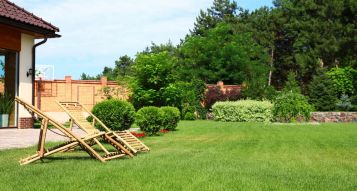
The longest of days and the brightest of sunshine make June a delightful month in which to enjoy strong plant growth and colourful flowers. The danger of frost is a thing of the past and it’s safe to plant outside all manner of exotic summer bedding and tender fruit and vegetables.
Click Here
While weeds can be dug out of flower borders, it's next to impossible to dig out dandelions, clover and creeping trefoil without making a real mess of the lawn. Clean out weeds from a summer lawn with a special selective weed killer that can kill broadleaved weeds... -
Autumn Tips For Looking After Your Lawn
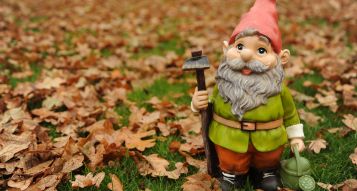
Autumn will soon be with us and the season of mellow fruitfulness is just around the corner. In the garden it is time to pick top fruit, clear away dead summer flowers and tidy up lawns in preparation for winter and next spring.
Click Here
As temperatures drop and rainfall increases the growth of grass tends to slow down in preparation for autumn and winter. The lawn is still active albeit maybe a little slower and will benefit from feeding, weeding and regular mowing.
When feeding, look out for signs of weeds, pest and disease. Use professional weed co... -
7 tips for looking after your lawn in winter.
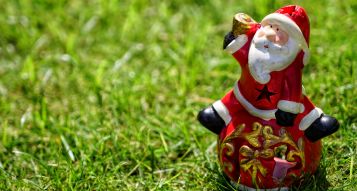
Feed your lawn
Click Here
The best solution is to apply some iron and seaweed (in liquid form) to your lawn. This tonic for turf helps to reduce plant stress, and hardens grass to protect it throughout the colder months.
Keep of the lawn
Try to rest the lawn as much as possible during winter by keeping of the grass. If practical don’t go on it when wet or frosty. As grass is not actively growing during this time, it will not repair itself if damaged until the spring.
Don’t mow the lawn
During the winter your lawn should stop growing and therefore... -
How to mow your lawn – Tip 3 – Vary Your Mowing Patterns
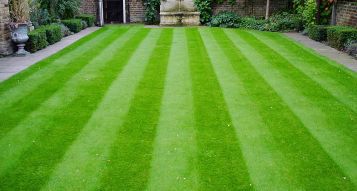
Each time you mow your grass, mow it in a different direction to the last time. Let's face it, we all get into the habit of mowing our lawns the same way everytime.
Click Here
When you always cut your lawn using the same mowing pattern, your grass learns which direction it’s being cut from and begins to lean in the direction you mow.
By varying the mowing pattern, and thus the direction you cut the grass in, you help avoid forming ruts in the lawn.
The benefit is that the grass will stand up nice and tall since it will be mowed from all different dir... -
How to mow your lawn – Tip 2 – Mow a dry lawn

The best time of day to cut your grass is in the early evening. Mowing your lawn at the peak of day, when temperatures are highest, stresses both the lawn and the mower.
Click Here
If you wait until the early evening, the lawn is usually dry (unless it has rained during the day), the sun is not as strong, and the grass will have plenty time to recover before the next afternoon’s heat arrives.
Even if it hasn’t rained, lawns are usually wet in the morning because of moisture from dew or fog.
If it does rain, wait for your lawn to dry before mowing,... -
How to mow your lawn – Tip 1 - Set your lawn mower high
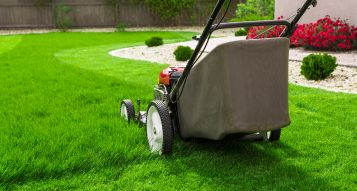
The grass cutting season in the UK typically starts around mid-March to early April when the weather begins to get a little warmer, which in turn encourages the grass to grow.
Click Here
The grass cutting season generally ends in October when the temperature begins to decline and grass growth slows down.
These dates will vary each year depending on the weather and area in the country you live in.
The golden rule of mowing your lawn is to only cut the top 1/3 of the grass blades at any one time, even if this means you have to cut the grass again after s... -
Lawn Care In The Heat
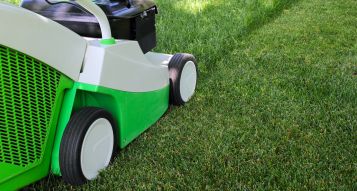
Now the weathers getting warmer your grass should start to grow and thicken up. For best lawn results you should have a think about purchasing a good fertiliser and mow a few times a week.
Click Here
As the weather in the UK is currently pretty hot, you should most definitely spending extra time and care on giving your lawn a water every couple of days to avoid dry patches and brown streaks.
By mowing the lawn a couple of time a week and adding fertilizer you are promoting growth in your lawn - this helping it to stay healthy, become strong and thicke... -
Spring Time Lawn Care

Spring is an important time of the year to start looking after your lawn.
Click Here
After the winter period it needs looking after to give your lawn a good start.
As the grass starts to grow after its winter sleep, it’s important to set your mower on a higher setting so only cutting the top off the grass over the next few weeks of mowing.
This will help the grass to grow quicker and after a few weeks you can set your mower back down to a lower setting.
The aim should be to keep it at the same height all through spring. For most lawns this should be... -
Lawn Turf Nottingham
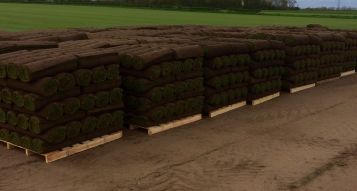
If you’re looking for lawn turf in Nottingham, look no further than Marks Turf & Landscapes. As the leading suppliers of lawn turf in the Nottinghamshire region, you can count on a quality product, supplied with excellent customer service, laid by skilled professionals who take great pride in their work.
Click Here
The perfect way to achieve a beautiful and healthy lawn, our garden turf is competitively priced and is freshly cut to ensure consistent levels of quality throughout. We can typically provide a next day service for customers living in the No... -
Lawn Turf Mansfield
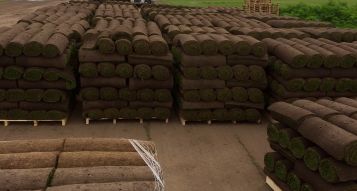
At Marks Turf & Landscapes, we supply a comprehensive range of garden turf for commercial, private and residential customers, all at highly competitive prices. Whether you’re a homeowner with a new garden space, company with a business park or a local council in need of some quality turf, you can be rest assured that Marks Turf & Landscapes will deliver beyond expectation.
Click Here
Centrally located, we are ideally positioned to serve all customers throughout Mansfield and the surrounding areas with our quality selection of garden turf.
We pride our...
